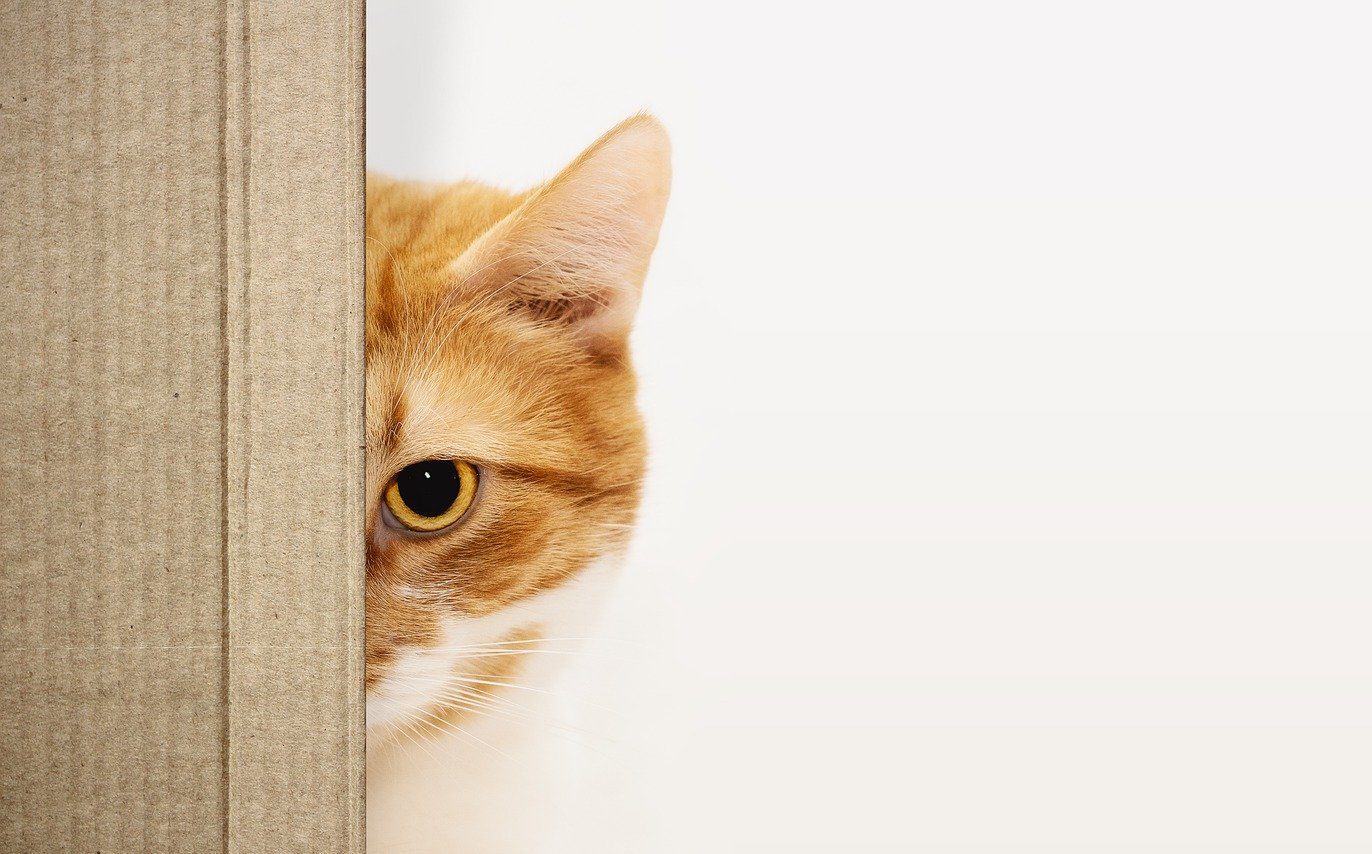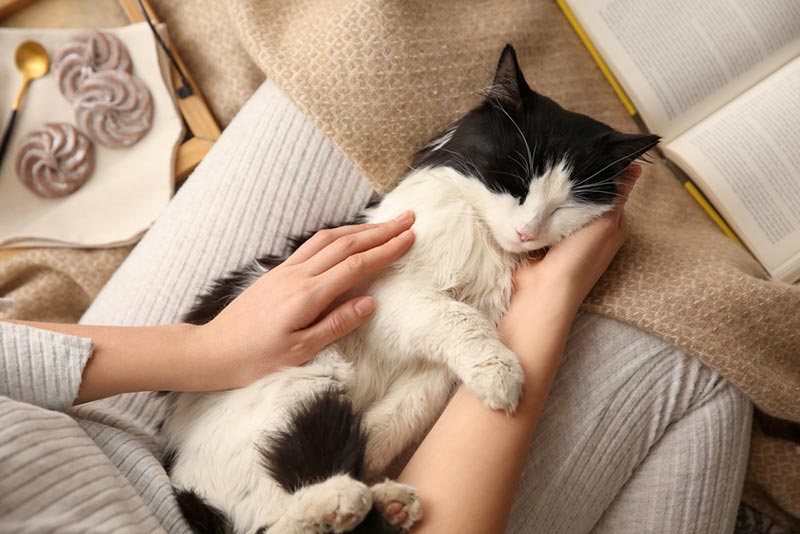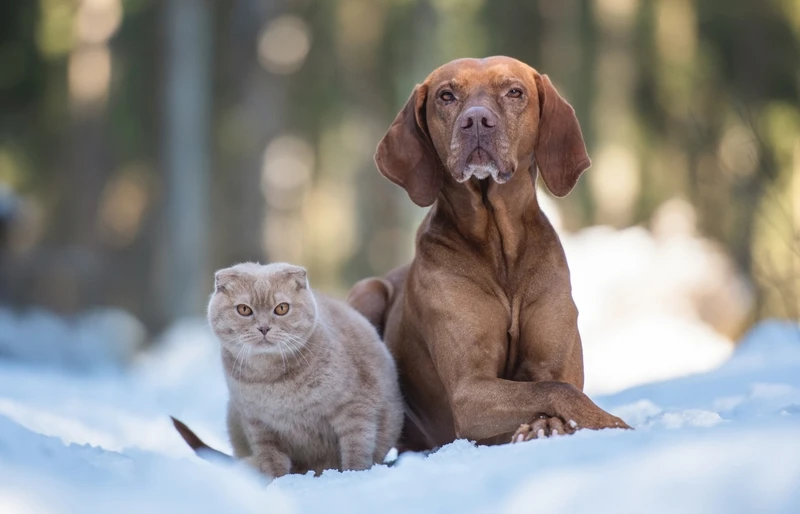2 Homemade & Vet-Approved Kitten Formula Recipes

Updated on
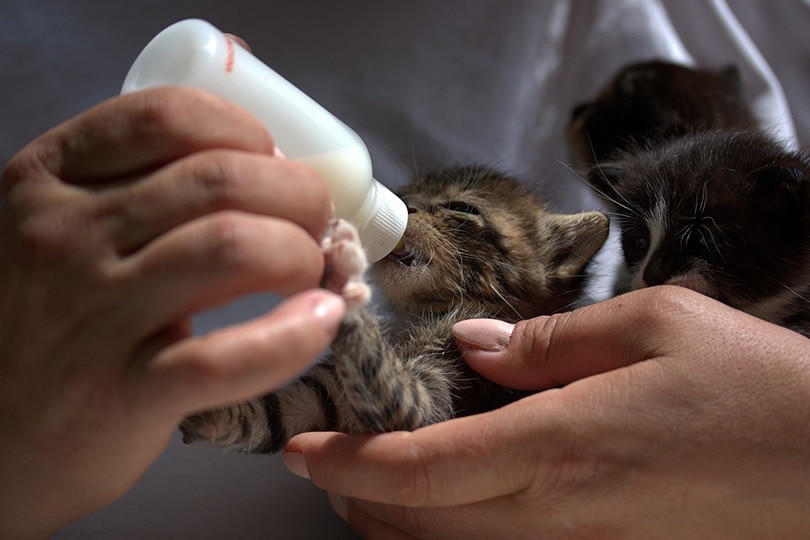
Click to Skip Ahead
Having a litter of kittens is often a joyous experience and watching those tiny balls of fluff grow up into confident youngsters can be a real pleasure. But sometimes, things don’t go to plan, and the queen (mother cat) cannot provide the kittens with the milk that they need. This might be because they are sick themselves, or they are not producing enough milk, or they reject their kittens. Sadly, it might even be because the queen passed away during labor.
If you find yourself in this situation, you may quickly need to find someone to feed your hungry kittens. Can you rustle up something at home that will do the trick? The answer is yes—but it might not best choice.
What Is the Best Food To Feed a Newborn Kitten?
1. Natural Milk
The best milk to feed newborn kittens is, of course, the milk that comes from their own mother. Not only is it perfectly balanced for their nutritional needs, but it also contains antibodies—infection-fighting proteins that will help to keep kittens safe in their first weeks of life. The levels of antibodies are particularly high in colostrum—the milk that the queen produces for the first 12–24 hours after birth.
If your queen is trying to nurse but is not producing enough milk for the kittens, then speak to your veterinarian as there are medications available that can help to increase her supply of milk.
There are some situations where a queen is unable to feed her kittens. In those cases, the next best option would be to find a surrogate mother who can take care of the kittens. In the wild, queens who live in the same group will also nurse other kittens as well as their own, so this is a normal, natural process. Speak to your veterinarian for more advice on finding a foster mother, and on introducing her to the kittens.
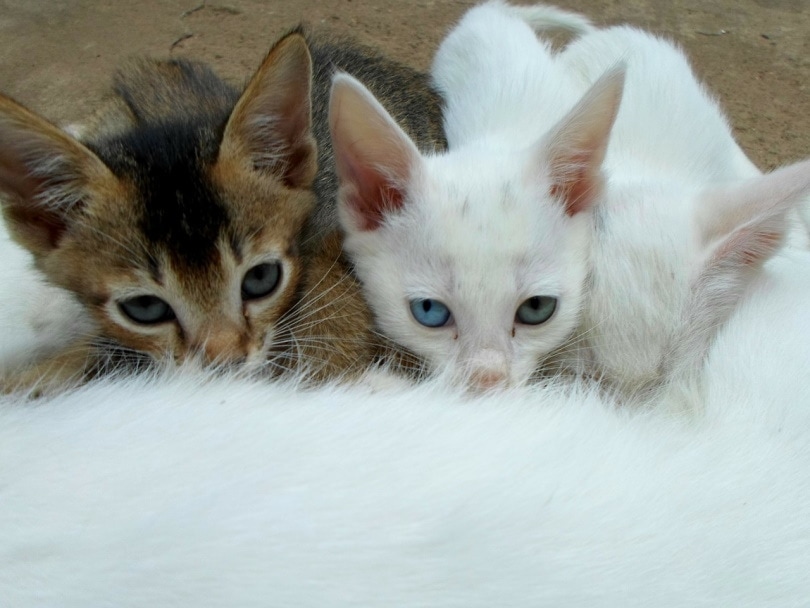
2. Replacement Formula
If a kitten cannot receive milk from their mother or a surrogate, then the next best option is a commercial milk replacer. There are many different brands available, and you may find that your kittens prefer one type or another. However, as long as the milk replacer is specifically designed for use in kittens (not for dogs, or other species), then it should provide them with everything that they need.
3. Homemade Kitten Formula
Home-made kitten formula should only be used in an emergency, to allow you to feed the kittens until you can get hold of some commercial formula. There are several reasons why homemade kitten formula is not as good as a commercial formula:
- Homemade formula recipes are not as close to real cat milk as commercial formula, on a nutritional basis.
- It can be difficult to find exactly the right ingredients, and you cannot simply swap them for something else—foods that look similar may have a very different nutritional makeup.
- Even if you can find the listed ingredients, their nutritional makeup can vary, meaning they may contain a different balance of nutrients than those used to originally create the recipe.
- It is not possible to be as precise when mixing the ingredients in a normal kitchen as it is in a factory setting.
Can I Just Use Cow/Goat/Sheep Milk?
Unfortunately, you cannot use milk from another species to feed kittens. None of these other kinds of milk will provide for kittens’ nutritional needs, and they may be hard for kittens to digest, which can lead to diarrhea.
How Should I Feed a Newborn Kitten?
Hand-rearing a kitten might sound fun, but it can be very tricky and time-consuming. Sadly, not all hand-reared kittens will survive, but there are a few things that you can do to give your little ones the best odds.
1. Make Up Good Feed
Be sure to follow the instructions for mixing your formula. Commercial formula must be made up carefully according to the instructions on the pack. If the formula comes as a powder, be precise about the amount of water you mix in. If there is too much water, the feed will be too dilute, and the kitten may not get enough nutrients. On the other hand, if there is too little water, then the feed will be too concentrated, and the kitten may quickly become dehydrated.
Homemade formula must be made using the same ingredients as in the recipe, and each one must be measured out precisely. Otherwise, the feed may be unbalanced and could cause the kittens to become sick.
The formula should always be warmed up to 100oF (38oC) before feeding. Feeding chilled formula can cause kittens to become very cold, which can make them seriously ill.
2. Feed Sensibly
You can feed your kitten using a bottle, or a syringe with a small teat attached to the end. Syringes may be better for very young kittens, or those who are weak and find it hard to suckle. Bottles can be used at any age but may be easier for older kittens. Some kittens are fussy about the type of teat on their bottle, so if you have a difficult feeder, try using a variety of different shapes and sizes.
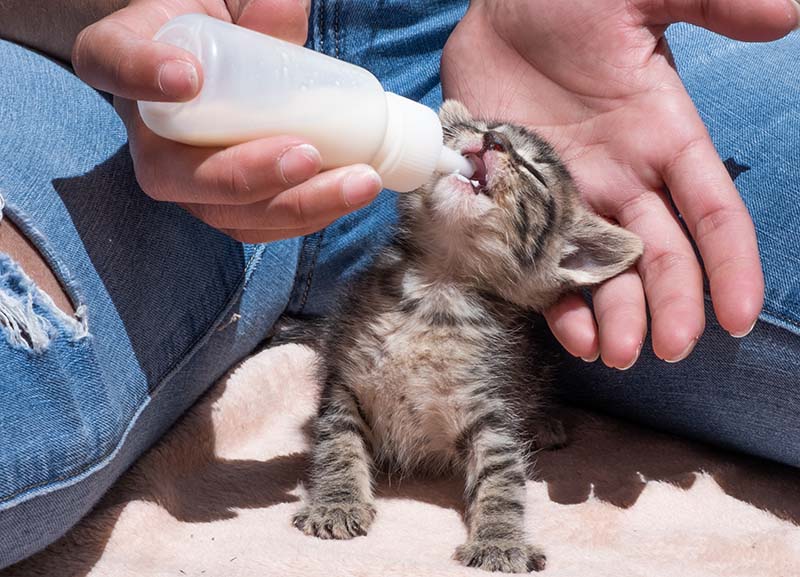
3. Feed Regularly
Newborn kittens (less than 1 week old) should be fed every 2–3 hours, and that means overnight, too. Otherwise, they will be prone to low blood sugar, which can be very serious in young kittens. As they get older and stronger, they can start having fewer, larger feeds, but even older kittens will still need feeding at least 4–5 times a day. Weak or sick kittens should still be fed every 2–3 hours.
4. Stimulate After Feeding
Hand-reared kittens should be encouraged to urinate and defecate after they have been fed. Normally, their mother would lick them to stimulate their bladder and bowels. We can mimic this by lying them on their back and gently rubbing their perineum (around their anus and genitals) with a cloth that has been dipped in warm water. Use gentle stroking or circling motions with a single finger for a few minutes after each feed. You should see urine after almost every feed, and feces at least 1–2 times a day.
5. Monitor Their Progress
It is important to track your kittens’ progress carefully, as this will help you to spot if there are any problems. You should record each time they feed, how much they drink, and whether they passed urine or feces afterward. It is also important to weigh kittens at least once a week to make sure that they are growing. Choose a digital kitchen scale that can measure small changes in weight.
Each kitten should gain around 100g of body weight per week when they are young. Very small or sick kittens can be weighed daily and should gain a minimum of 7g per day. If they are not gaining this, then you should see a veterinarian urgently.
How Do I Make Homemade Kitten Formula?
There are many different kitten formula recipes available online, but many of them are from unknown sources or have been passed around and changed over time. Formulating kitten milk (and indeed any other pet food) is complex and must be done by experts—getting it wrong can cause the kittens to become sick and die. Do not be tempted to use other recipes unless you know that they have been approved either by a veterinarian who is a specialist in nutrition, or by a scientist who has an MS or PhD in animal nutrition.
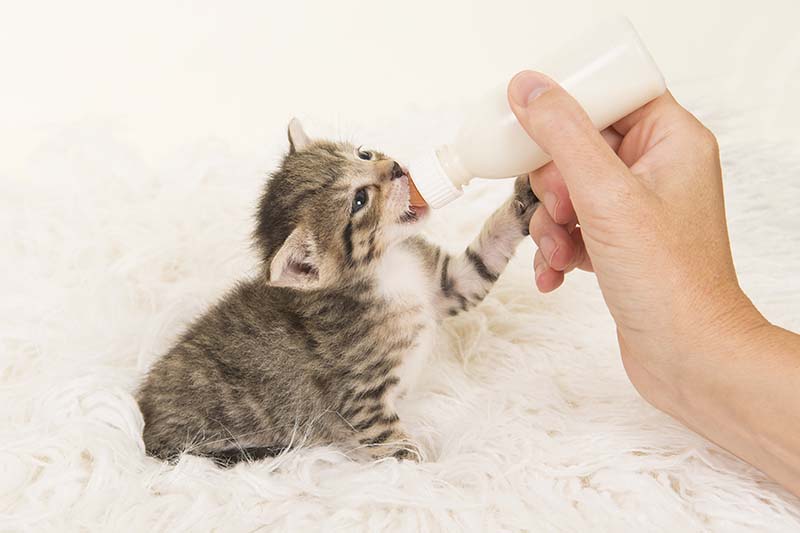
These are two recipes that have been approved by veterinary nutritional experts, so will be the best options until you can find some commercial formula:
Recipe 1 |
|
| Skim milk | 70 g |
| Low-fat curd*** | 15 g |
| Lean beef hash | 8g |
| Egg yolk | 3 g |
| Vegetable oil | 3 g |
| Lactose | 0.8 g |
| Vitamin-mineral mix | 0.2 g |
| Total | 100 g |
| Note – the curd must NOT be cottage cheese, as this may clot in the kitten’s stomach. | |
Recipe 2 |
|
| One whole egg, fresh | 15 g |
| Protein supplement | 25 g |
| Sweetened condensed milk | 17 ml |
| Corn oil | 7 ml |
| Water | 250 ml |
| Total | 310g |
Both recipes are from Thatcher, C., Hand, M.S., & Remillard, R. (2010). Feeding Nursing and Orphaned Kittens from Birth to Weaning. Small Animal Clinical Nutrition (5th Ed) 23: 425
These recipes will produce a feed that is similar to natural cat milk. However, it is still not as close to the real thing as a commercial formula.
Each kitten should be fed around 18ml of formula per 100g of body weight to start with. If they are not gaining weight, then this should be increased slowly.
Once the formula has been made up, it can be kept at room temperature for an hour, or in the fridge for up to 24 hours. It must be thrown away after this, as bacteria love to grow in milk or milk replacers, and kittens can quickly become sick from drinking contaminated milk. Remember to warm it before feeding.
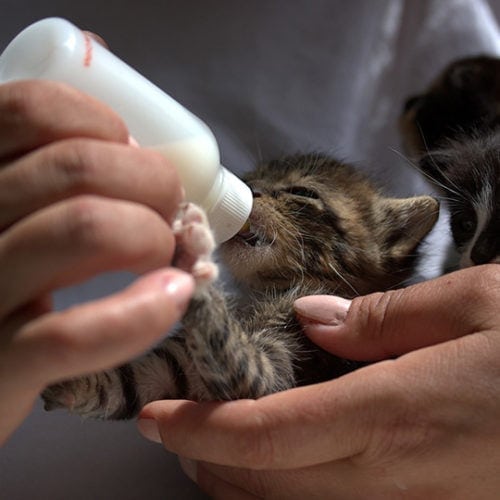
Homemade Kitten Formula (Vet-Approved)
Equipment
- Bowl
- Spoon or whisk
Ingredients
- 70 g Skim milk
- 15 g Low-fat curd
- 8 g Lean beef hash
- 3 g Egg yolk
- 3 g Vegetable oil
- 0.8 g Lactose
- 0.2 g Vitamin-mineral mix
Instructions
- Combine all ingredients.
- Each kitten should be fed around 18ml of formula per 100g of bodyweight to start with. If they are not gaining weight, then this should be increased slowly.
- Once the formula has been made up, it can be kept at room temperature for an hour, or in the fridge for up to 24 hours. It must be thrown away after this, as bacteria love to grow in milk or milk replacers, and kittens can quickly become sick from drinking contaminated milk. Remember to warm it before feeding.
Notes
Conclusion
Homemade kitten formula can be used in an emergency but is not as good as natural cat milk or commercial formula. This means that it should only be used to fill in the gap until you can get hold of some properly balanced formula. If you are having difficulty finding this, then speak to your vet.
Featured Image Credit: Adina Voicu, Pixabay




